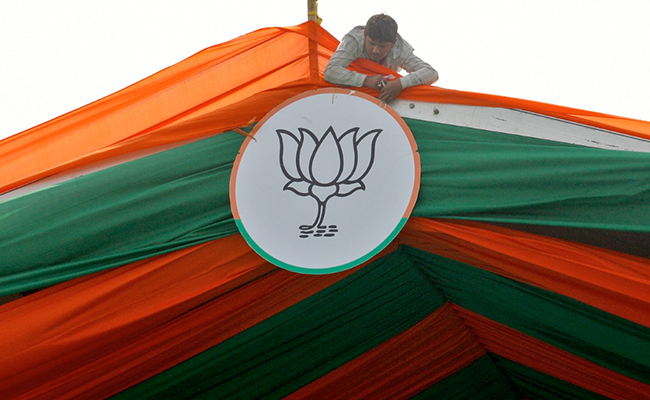
The 2024 general election will be a decisive one in many ways. Yet, the most important one will be how the voters' mind and priorities have changed.
Prime Minister Narendra Modi and his Bharatiya Janata Party (BJP) effectively crushed the opposition north of the Vindhyas in 2019. Only 30 of its seats-28 from Karnataka-came from South India, and yet it easily topped the 300-mark. The Prime Minister and party have shown no signs of fatigue, dominating the political narrative in Parliament, media, public sphere, on social media networks, and at the grassroots. The unwieldy opposition alliance, INDIA, has collapsed, coming apart at the seams under the weight of the partners' ambitions and the organisational weakness of the Congress Party which is trying to hold it together. One key ally in Bihar, Nitish Kumar, has already defected to the BJP-led National Democratic Alliance (NDA).
Modi's Grand Ambition
The engineering aside, Modi has staked his own soaring popularity in aiming for 370 seats for the BJP and over 400 for the NDA. In 2014, the BJP won nine seats for every percentage point gain in vote share. That dropped to eight seats per percentage point in 2019. If it maintains the same rate, it will need about 45% vote share to hit Modi's target. No party can match the well-oiled, tech-savvy, cash-rich BJP organisation and its grassroots reach backed by the disciplined cadre of the Rashtriya Swayamsevak Sangh (RSS) down to the booth level.
If Modi is able to manifest the kind of victory he is aiming for, the country will cross the rubicon to a level of one-party dominance that will be difficult to reverse. Foreign minister S. Jaishankar assured a Japanese audience last week that India will have a stable government with a parliamentary majority for at least the next 15 years, if not more.
Modi And The Ram Temple
The ever-on-the-move election juggernaut of the BJP shifted gears on the day the Ram Temple was consecrated, reminding Hindu voters of a pledge redeemed and Kashi and Mathura as promises in progress. The ceremony was also akin to a coronation, with the focus unwaveringly on PM Modi.
After he led the ceremonies, one of the speakers compared him to Shivaji, the Maratha king, subtly signalling that a person who was not born in an upper caste was leading a Hindu religious ceremony, and, by extension, a new nation that was not the inheritance of the high-born. The protest from the Shankaracharyas reinforced the theme, reminding even more of Shivaji's 17th-century coronation, for which he had to get priests from Varanasi at a great cost given that no local Brahmins would place the crown on his head as they believed he was "low-born".
Confident Yet Cautious
Besides Modi's popularity, the BJP's election campaign rests on a two-pronged strategy: a strong Hindu nation rubbing shoulders with world powers, and an economic powerhouse that will set millions of citizens on the road to riches. While one half of the strategy is fairly successful, it is the second part where voters' minds are unclear. As the Pakistan elections proved recently, irrespective of the hurdles placed in their path, voters are capable of surprises.
No one is more acutely conscious of this than the BJP. Also because it is haunted by its own defeat in 2004 when it missed the woods for the trees. Blinded by booming stock markets and soaring corporate profits, its leaders failed to see the economic distress at the grassroots.
The economic situation would have resembled that of 2004 if not for free food, some free cash and an ever-expanding rural jobs programme, which was once pilloried by the Prime Minister himself as merely digging pits. Tamil Nadu, Uttar Pradesh, Bihar, Madhya Pradesh, Rajasthan, Odisha, and Andhra Pradesh saw demand for work under Mahatma Gandhi National Rural Employment Guarantee Act (MNREGA) rising sharply in 2023. Although the farmers' strike in Delhi gives the appearance of largely a Punjab phenomenon, unpredictable weather destroying crops and knee-jerk policy changes, such as export bans to curb inflation and keep the middle-class consumer happy, have affected agriculturists across the country. The worst affected are landless farm workers. The flow of workers from farms to factories reversed about four years ago and is now virtually an exodus.
Odds Are In BJP's Favour
The belligerence and noise of the grassroot workers of the RSS and the BJP have made sure that ordinary people do not speak their minds in public. Critical voices even from within the organisations are being shouted down. With a decent opposition near absent, the odds are heavily stacked in the BJP's favour.
In one WhatsApp campaign, the BJP exhorts voters to keep their weapon-vote-ready as the war to protect democracy is hither. "Soldiers are guarding our nation at the borders. We have to fight the traitors within the country", it says.
If the BJP achieves Modi's target, the sentiment underpinning its victory would easily be interpreted as a vote for a muscular Hindu nation. But if it ends up closer or below its current seat count, it will be a hint that they value their economic future more than religious hegemony. That is why this is a decisive election.
(The writer is editor of The Signal and author of The RSS And The Making Of The Deep Nation.)
Disclaimer: These are the personal opinions of the author.


